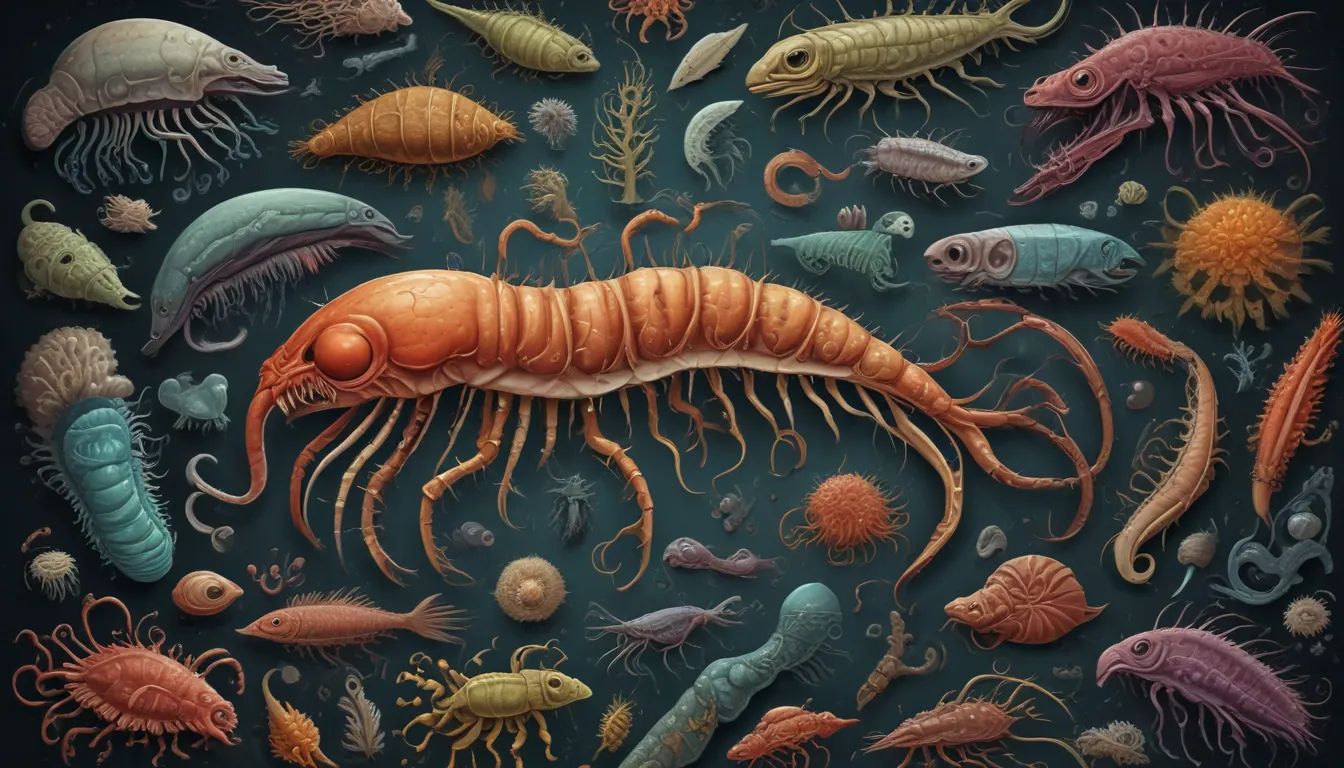The pictures we use in our articles might not show exactly what the words say. We choose these pictures to make you interested in reading more. The pictures work together with the words but don’t take their place. The words still tell you the important facts.
Welcome to the intriguing world of parasites! From tiny organisms to deadly threats, parasites play a significant role in our daily lives. You may not realize it, but you are already sharing your body with thousands of these creatures. While most parasites may not harm you, it's essential to understand the role they play in our ecosystems. Let's delve into the world of parasites and explore some fascinating facts that will enhance your knowledge and understanding of these unique organisms.
Unveiling Parasitic Beings: A Closer Look
Parasites are a diverse group of organisms that thrive on or within a host organism, often at the host's expense. The term "parasite" originated from the Greek word 'parasitos,' which means 'beside the food.' These organisms are believed to be the most common life forms on Earth, constituting more than 80% of all living things. Parasitology is the scientific division dedicated to studying these fascinating creatures, shedding light on their behaviors and impact on the host.
Exploring Parasite Categories
Parasites fall into three distinct categories: protozoa, helminths, and arthropods. Protozoa are single-celled organisms, while helminths, also known as worm parasites, include species like pinworms and tapeworms. Arthropods, although not technically parasites, are insects that often serve as vectors for common parasitic diseases. Within the realm of parasites, two main types exist: endoparasites and ectoparasites. Endoparasites cause infections within the host's body, while ectoparasites, such as those found on the skin, pose external threats.
Intriguing Parasitic Lifestyles
Parasites exhibit a fascinating array of behaviors and adaptations. From head lice infestations among children to the astonishing reproductive capabilities of hookworms, these organisms can cause various health issues. For instance, a female hookworm can produce up to 20,000 eggs per day, emphasizing their remarkable reproductive abilities. Moreover, parasites like tapeworms, despite their eyeless nature, can survive in a host for up to 30 years, highlighting their resilience and adaptability.
Unveiling Ancient Parasite Origins
The history of parasites dates back centuries, with the earliest identified human parasite being the lung fluke. Ancient fossil records and mummies provide valuable insights into the prevalence of parasitic infections throughout history. Scientists have traced the origins of parasites like fleas and mosquitoes to millions of years ago, shedding light on the enduring presence of these organisms in nature. Moreover, advancements in microscopy have revolutionized our understanding of parasites, enabling researchers to uncover hidden aspects of their biology and impact on human health.
Impact of Parasites on Human Health: A Closer Examination
Parasites can have profound effects on human health, ranging from minor discomfort to life-threatening conditions. Protozoa parasites, such as the plasmodium responsible for malaria, are known for their deadly effects on humans. These unicellular organisms pose significant health risks, causing widespread diseases and mortality worldwide.
Understanding Helminths and Ectoparasites
Helminths, characterized by their flattened, tube-like bodies, are common parasites that can lead to severe health complications. Ectoparasites, including head lice and scabies mites, infest the skin and can cause various dermatological issues. These parasites highlight the diverse ways in which organisms interact with human hosts and the challenges they pose to public health.
Health Implications of Parasitic Infections
Parasitic infections can affect various organ systems, leading to digestive disturbances, allergic reactions, and even organ damage. Some parasites secrete toxic waste products that can be harmful to the host, contributing to illness and discomfort. Additionally, parasites can disrupt the body's natural functions, impacting digestion, circulation, and overall well-being.
Uncovering Rare Parasitic Encounters
In rare instances, individuals may experience unusual encounters with parasites, such as eye worms residing in the ocular region or tapeworms exceeding lengths of 30 feet. These unique cases highlight the diversity and complexity of parasitic interactions with humans. Understanding these rare encounters can provide valuable insights into the myriad ways parasites can affect human health.
Parasites in Nature: Ecosystem Implications and Interactions
Parasites play a crucial role in ecosystems, influencing the balance of species and contributing to biodiversity. From blood flukes in aquatic environments to dust mites in household settings, parasites are ubiquitous in nature. Understanding their ecological significance and interactions with other organisms can offer valuable insights into the intricacies of the natural world.
Ecological Dynamics of Parasites
Parasites contribute to the interconnectedness of ecosystems, impacting species diversity and population dynamics. Bloodworms, for example, serve as vital components of the aquatic food chain, sustaining various organisms in aquatic environments. Additionally, parasites like fleas and ticks play essential roles in maintaining ecological balance, despite their negative effects on human health.
Human-Parasite Relationships: Historical Perspectives
Throughout history, humans have grappled with parasitic infections, leading to significant health challenges and societal implications. From medieval crusaders facing worm infestations to modern-day outbreaks of parasitic diseases, the relationship between humans and parasites has shaped medical practices and public health strategies. By examining historical cases of parasitic encounters, we can gain a better understanding of how these organisms have influenced human societies over time.
Emerging Parasitic Threats: Contemporary Concerns
Contemporary challenges posed by parasites, such as the prevalence of diseases like malaria and Chagas disease, underscore the ongoing battle against these organisms. With advances in research and technology, scientists continue to explore new treatments and prevention strategies to combat parasitic infections. By staying vigilant and informed about emerging parasitic threats, we can better protect ourselves and our communities from the impact of these organisms.
The Future of Parasitology: Advancements and Innovations
As our understanding of parasites evolves, so too do our approaches to studying and managing these organisms. Advances in molecular biology, microscopy, and diagnostic tools have revolutionized the field of parasitology, enabling researchers to uncover new insights into parasite biology and ecology. By embracing innovation and collaboration, we can address the complex challenges posed by parasites and work towards a healthier, more sustainable future.
Harnessing Scientific Progress: Toward a Parasite-Free World
Through ongoing research and exploration, we are continually expanding our knowledge of parasites and their impact on human health and ecosystems. By leveraging scientific progress and interdisciplinary collaboration, we can develop effective strategies for preventing and treating parasitic infections. Together, we can work towards a world where parasites are better understood, managed, and controlled, paving the way for a healthier and more harmonious coexistence with these fascinating organisms.
In conclusion, parasites are an integral part of our environment, influencing ecosystems, human health, and society at large. By delving into the diverse world of parasites, we can gain a deeper appreciation for the complexities of nature and the vital role that these organisms play in the web of life. With continued research, education, and awareness, we can navigate the challenges posed by parasites and strive towards a future where we coexist harmoniously with these remarkable creatures. Stay informed, stay curious, and embrace the fascinating world of parasites that surrounds us.






